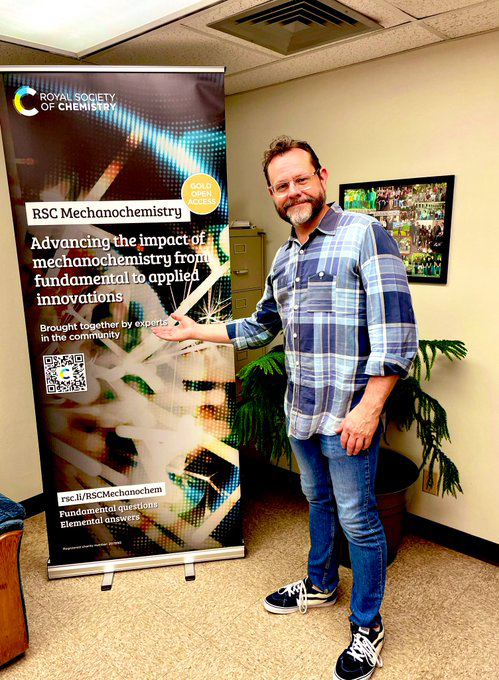
Dr. James D. Batteas, Regents Professor and D. Wayne Goodman Professor of Chemistry at Texas A&M University, has been selected as co-editor-in-chief for the Royal Society of Chemistry’s latest journal, RSC Mechanochemistry.
Launched in mid-May, the novel scientific addition is billed as the first dedicated to the study of mechanochemistry, or the science of using mechanical force to initiate a chemical reaction.
Batteas, an expert in materials chemistry of surfaces and interfaces and a faculty member in the Department of Chemistry since 2005, joins fellow co-editor-in-chief Dr. Tomislav Friščić, a professor in the School of Chemistry at the University of Birmingham, in leading the new journal, which is set to begin accepting submissions in late September. Both were instrumental in bringing the unmet scholarly need to the attention of the RSC on behalf of the mechanochemistry community and also have been staunch advocates of mechanochemistry and its complementary areas of related work.
“Mechanochemistry is a burgeoning field that crosscuts so many disciplines, from synthesis, to tribology, to food and pharmaceuticals, and mechanobiology,” Batteas said. “Importantly, for synthesis, it is also fast becoming an enabling technology for solvent-free, green and sustainable chemistry. In fact, in 2019, it was named by IUPAC [International Union of Pure and Applied Chemistry] as one of the top 10 innovations that will change the world.”

In addition to being exclusively focused on the central role mechanical forces at play in chemistry and many other disciplines, RSC Mechanochemistry will be dedicated to showcasing research across all areas of theoretical and experimental chemistry while also highlighting mechanochemistry as an enabling technology for sustainability. According to Batteas, content will range from original research articles to authoritative reviews and be selected on the basis of a focused and rigorous assessment process by peer reviewers and fellow experts in the field of mechanochemistry.
“As part of a leading scientific society, publishing with RSC Mechanochemistry offers authors a global reach as well as opportunities to engage with a myriad of interest groups to help foster connections and spread the word on their research,” Batteas added. “Our outstanding associate editors and editorial board provide an exceptional breath to the journal, so authors can be assured that their manuscripts are in the hands of leading experts who are dedicated to publishing their impactful science.”
As one of 17 gold open access publications within the RSC’s current portfolio featuring more than 50 world-leading journals spanning the core chemical sciences, all RSC Mechanochemistry content can be read for free online. In addition, Batteas says the RSC plans to cover all publication costs for authors until mid-2026.
Batteas, who is also a professor in the Department of Materials Science and Engineering, has served since 2020 as director of the Texas A&M-based National Science Foundation Center for the Mechanical Control of Chemistry, a Phase I CCI that was the first NSF Center for Chemical Innovation to be funded in Texas. He earned his Ph.D. from the University of California at Berkeley in 1995 and was a postdoctoral fellow at Harvard University (1995-1996) before starting his independent academic career as a chemistry faculty member at The City University of New York (1996-2002). He then spent three years as a research chemist at the National Institute of Standards and Technology (2002-2005) prior to coming to Texas A&M, where he leads an exceptional research program concentrating on the fields of surface chemistry and tribology — the study of friction and wear — that focuses on the bridge between chemistry and mechanics as well as the broader interdisciplinary and real-world applications.

“We look for RSC Mechanochemistry to become the home for the blending of the ideas, scientific language and approaches that bring together the many disciplines and communities that mechanochemistry touches, with the goal of building knowledge and fostering innovation and discovery at the forefront of chemistry,” Batteas said. “As co-editor-in-chief, I hope to help cultivate a greater understanding of mechanochemistry across the whole of chemistry and its related areas, which will have significant economic and societal impacts.”
Learn more about RSC Mechanochemistry or Batteas’ research on surfaces and interfaces of materials.

